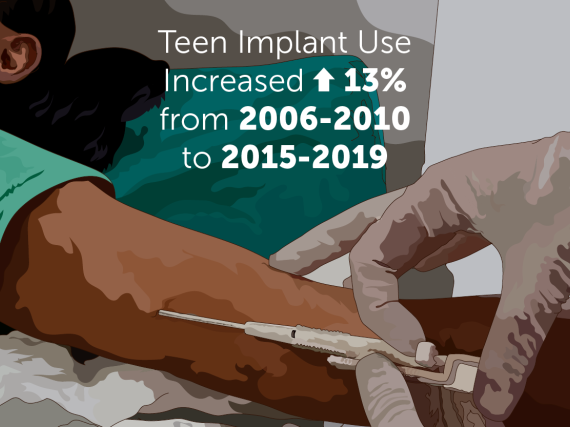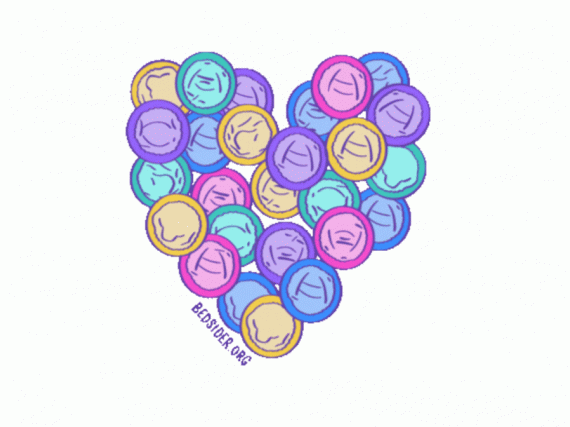Birth Control Information on Social Media
Young people deserve access to quality sexual and reproductive health (SRH) information, and social media is an increasingly relevant information source. Power to Decide’s 2023 Thanks, Birth Control Survey found that 25% of participants age 20–29 years had received information about birth control from social media in the last year. Given the role that social media plays in educating young people about SRH, multiple recent studies have assessed the content and quality of contraception information on various social media platforms.
Across platforms, birth control content related to patient experiences and side effects seems to be the most common. For example, a recent study of TikTok content found that about half of the videos analyzed addressed these topics. In their study of Reddit posts, Pleasants et al. 2023 found that “SideEffects!?”, applied to 40% of posts, was the most common flair used. Studies have documented a negative tone associated with birth control content on social media. Another TikTok study focused on IUD content found that all top #IUD videos related to patient experience had a negative or ambiguous tone, and nearly 97% of videos referenced pain or other side effects. An analysis of birth control information on Pinterest found pins about birth control pills were often negatively framed. Studies of contraceptive content on Twitter (e.g., Merz et al. 2021, Pillarisetti et al. 2022) have found high prevalence of negative tweets overall. Such content may not reflect the complexity of young people’s experiences with and attitudes about contraception as nearly three-quarters of the 2023 Thanks, Birth Control Survey participants strongly agreed/agreed that the benefits of birth control outweigh the side effects.
Some of these studies and others have also documented inaccurate or misleading content. The analysis of #IUD videos on TikTok found that among the most liked videos with scientific claims, about one-quarter (24.4%) were moderately (18.8%) or highly (5.6%) inaccurate. A study of YouTube videos from social media influencers found that fitness and lifestyle influencers commonly discussed discontinuation of hormonal birth control to be more natural and improve mental health. Such content could contribute to a notable finding from the 2023 Thanks, Birth Control survey data—nearly one-third of those who received birth control information from social media in the past year strongly disagreed or disagreed that hormonal birth control is safe.
A promising finding from this body of literature is high engagement with content from health care professionals. One of the studies of TikTok content found that while only about 20% of videos were created by health care professionals, these videos accounted for two-fifths of total views. Most of the videos from health care professionals were educational in nature. Such findings suggest that health care professionals have an opportunity to engage with young people on social media and provide comprehensive, medically accurate contraceptive education via these platforms. The 2023 Thanks, Birth Control Survey finding that 86% of 20–29-year-old respondents prefer to receive birth control information from their health care provider underscores this point.
Power to Decide is working to harness the power of social media and health care providers as information sources. We have launched the social media series #AskDrRaegan to invite young people to ask a board-certified obstetrician-gynecologist about their reproductive well-being. Dr. Raegan provides medically accurate information about sex, sexual health, and birth control via Twitter, TikTok, and YouTube. Video content from the series includes a library of Birth Control Basics on YouTube, a collection of 17 detailed overviews of FDA-approved birth control options, along with over 30 short-form videos across Instagram Reels, TikTok, and YouTube Shorts, all of which answer a frequently asked question. To date, the #AskDrRaegan hashtag on TikTok has 2.8 million views and tens of thousands of engagements. Power to Decide’s flagship website Bedsider.org and associated social media accounts also provide medically accurate, relevant, and resonant information about birth control.
At a minimum, it’s important that health care providers are aware of social media as an information source and understand the narratives about birth control that are being shared online. Knowing the birth control information patients have received prior to their visit, including from social media, may help providers feel more prepared to support contraceptive decision-making.
Social media presents a unique opportunity to democratize access to information, yet there is a need to ensure high-quality educational content. Public health and clinical professionals can leverage these various platforms to provide trusted, comprehensive, and accurate information that supports the sexual and reproductive well-being of all.



